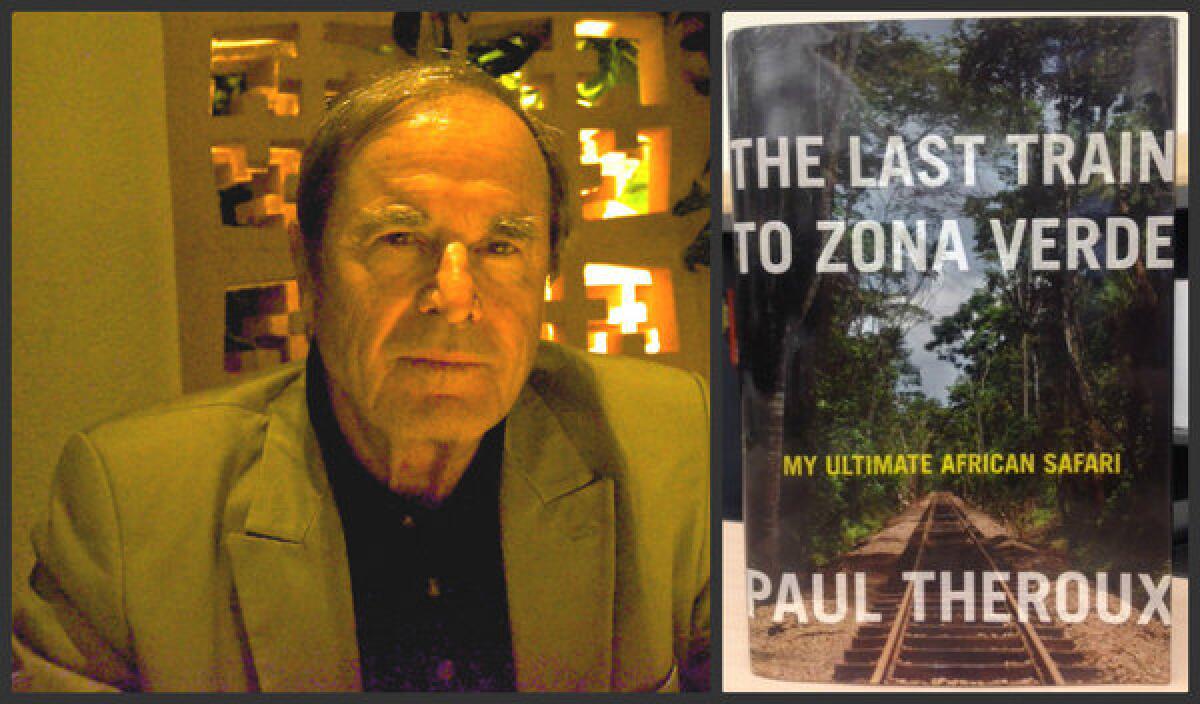Done with Africa, travel author Paul Theroux looks stateside

- Share via
It’s been half a century since Paul Theroux showed up as a fresh-faced Peace Corps volunteer in Malawi, Africa. It’s been 38 years since “The Great Railway Bazaar” made his name as a travel writer, and about 11 since he traveled overland from Cairo to Cape Town for the book “Dark Star Safari.”
His newest work is “The Last Train to Zona Verde: My Ultimate African Safari,” which begins in Cape Town and winds up amid menace and melancholy in Angola. It’s an “ultimate” safari, all right -- in the sense that he’s done with Africa now.
But other things are percolating. I recently sat with Theroux, 72, in the Polo Lounge at the Beverly Hills Hotel to talk about Africa, footloose authors from Massachusetts, and why he recently attended a gun show in Southaven, Miss. Here’s an edited excerpt from the interview.
How did this latest Africa book happen?
I started thinking about going back to Africa almost from the very beginning, from the time I left.… I thought, I want to see what happened to my school, what happened to my friends, and I also wanted to go to places I hadn’t been to before, Sudan and Ethiopia. So going overland from Cairo to Cape Town was a revelation to me. It was difficult, it was dangerous at times. But it was full of enlightenment.
And then, I thought: I’ll let 10 years pass and I’ll continue the trip, resuming in Cape Town, seeing what changes had taken place there. Actually, I had Angola on my mind. Angola is off the map. Tourists don’t go there. There are no wild animals there -- they’ve all been blown up by land mines, or eaten.… A place that doesn’t welcome tourists, that’s really difficult and off the map, is a place I want to see.
What was the riskiest moment?
The worst thing that can happen to you in travel is having a gun pointed at you by a very young person. That’s happened to me maybe four times in my life. I didn’t like it. Or having a rusty spear jabbed at you, as happened to me in New Guinea. On this trip, I would say [it was] being driven by a drunken driver in Southern Angola. Speeding, drunken, bad road. I’m telling him to slow down, he doesn’t care. Music’s playing. I think: I don’t need this. It’s not as dangerous as being shot at, but it’s, you know, my limit.… One wrong move, we’re off the road, we’re in a tree, we’re going to have a head-on collision.
What’s the difference between you as a 22-year-old traveler and you as a 72-year-old?
I’m the same traveler that I was. If anything, I’m more patient, more grateful. Look at my life. I mean, I’ve been very, very lucky in my travel. Think of the awful things that could have happened to me -- and nearly did happen to me.… In the course of this trip, three people that I met died. And I discovered that a fourth one -- a woman that I met in South Africa, Vicki, [who was running a bed-and-breakfast], was stabbed to death by her husband.
Your home town, Medford, Mass., is a 20-minute train ride from Jack Kerouac’s home town, Lowell. (In May, Theroux wrote about revisiting the two towns for the magazine Penta.) Have you reread “On the Road” lately?
Not that long ago.… I didn’t make it all the way through. I found part of it heavy going, part of it just hurried.... But a lot of books that you read as a youth don’t stand up. “A Catcher in the Rye” didn’t stand up. “On the Road” didn’t stand up. Henry Miller doesn’t stand up. But at the time [when you’re 18], you’re thinking, “God, this is great!” Even “The Stranger,” Albert Camus, didn’t stand up. But … you reread “Madame Bovary” and you think, “My God, this is a masterpiece. This is the most wonderful book.”
I’ve been reading Nancy Drew books to my daughter, and in the last page or two, just as things are wrapping up, you can always count on the author to toss in a tantalizing reference to the next adventure in the series. I got the same sensation in the closing paragraphs of “The Last Train to Zona Verde,” when you wrote that all those red rural roads in Africa reminded you of the red roads of the American South. Is the American South your next project? If so, why?
It’s the way in which the rural South resembles the Third World. They face the same problems. Housing. Access to medical care. HIV. Education. Challenges. And at the same time, like the Third World, there are very salubrious cities. Augusta is beautiful. Atlanta is a big, bustling city. Tuscaloosa is a college town, big sports teams, they make Mercedes there. But they’re islands, and everything outside of those places is filled with difficulty. There’s a place, Allendale, South Carolina … it looks like Zimbabwe. A place where the farms aren’t farming and the factories are closed and the schools aren’t very good. Dirt roads, substandard housing.…
I’ve made three trips, each one about three weeks. I still haven’t been to Louisiana or Arkansas, which I’d like to. But I’ve made friends.… I went to Oxford, Miss., after going to a gun show in Southaven, Mississippi, and I can tell you, the gun show was a thousand times more interesting than Faulkner’s house.
Follow us on Twitter @latimestravel
Like us on Facebook @Los Angeles Times Travel
More to Read
Sign up for The Wild
We’ll help you find the best places to hike, bike and run, as well as the perfect silent spots for meditation and yoga.
You may occasionally receive promotional content from the Los Angeles Times.







